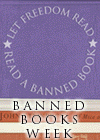
Banned Books Week 2002, a "celebration of your freedom to read," is September 21 to September 28. The week-long schedule of events across the country—observed every year since 1982—includes "readouts" that feature celebrities and book-loving locals reading from their favorite banned books.
Each year, the American Library Association's Office for Intellectual Freedom receives hundreds of reports on books and other materials that were "challenged" or asked to be removed from school or library shelves. The American Library Association's Office for Intellectual Freedom has recorded more than 6,500 book challenges since 1990.
Established to raise awareness of the censorship of books and to highlight the importance of free speech and the freedom of expression, Banned Books Week is sponsored by the American Booksellers Association, the American Booksellers Foundation for Free Expression, the American Library Association, the American Society of Journalists and Authors, the Association of American Publishers, and the National Association of College Stores.
The following is a list of the most frequently challenged books of 2001, compiled by the Office for Intellectual Freedom.
1. Harry Potter series by J.K. Rowling, for its focus on wizardry and magic.
2. Of Mice and Men by John Steinbeck, for using offensive language and being unsuited to age group.
3. The Chocolate War by Robert Cormier (the "Most Challenged" fiction book of 1998), for using offensive language and being unsuited to age group.
4. I Know Why the Caged Bird Sings by Maya Angelou, for sexual content, racism, offensive language, violence and being unsuited to age group.
5. Summer of My German Soldier by Bette Greene, for racism, offensive language and being sexually explicit.
6. The Catcher in the Rye by J.D. Salinger, for offensive language and being unsuited to age group.
7. Alice series by Phyllis Reynolds Naylor, for being sexually explicit, using offensive language and being unsuited to age group.
8. Go Ask Alice by Anonymous, for being sexually explicit, for offensive language and drug use.
9. Fallen Angels by Walter Dean Myers, for offensive language and being unsuited to age group.
10. Blood and Chocolate by Annette Curtis Klause, for being sexually explicit and unsuited to age group.







